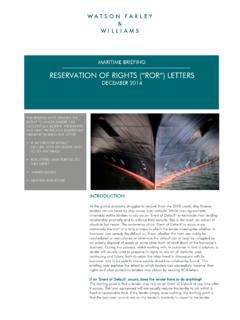Transcription of A Guide to Establishing a Business in theUK
1 A Guide to Establishing a Business in the UK Finance & investmentMaritimeEnergyNatural resourcesTransportReal estateICTC orporateFinanceTaxDispute resolutionEmploymentRegulatoryLondonNew York ParisHamburg Munich FrankfurtMilan RomeMadridAthensSingaporeBangkokHong Contents 01 Introduction 02 Possible formats 04 Taxation considerations 06 Value Added Tax 07 Registration and administration requirements 11 Employment considerations 13 Government and regional assistance 14 Contacts16 Our officesIntroduction 01 INTRODUCTION There are a number of formats which may be adopted by non UK resident individuals or companies wishing to establish a Business in the UK. This Guide considers the following forms: UK company or subsidiary; UK establishment (being a UK branch or UK place of Business ); UK agency; and UK partnership (including limited partnerships and limited liability partnerships).
2 The law described in this Guide is that applicable to England and Wales as at 1 April 2014. It should be noted that the position may vary in some respects under the laws applicable in Scotland and Northern Ireland. This Guide is not intended as a substitute for detailed legal advice which will differ according to the requirements of each particular Business to be established. For more detailed information or advice on these issues, please speak with your regular contact at Watson, Farley & Williams, or a member of our London Corporate, Tax or Employment teams or our Singapore Corporate team listed on pages 14 and 15 and they will be pleased to assist you.
3 This Guide places particular emphasis on the legal and taxation considerations which are relevant in deciding on the preferred form, although general commercial considerations will also need to be addressed. Relevant formation and administration requirements are also outlined, as are employment and other matters which are likely to require consideration. This Guide does not deal with European Economic Interest Groupings or the European Company (Societas Europaea) but further information can be provided on these entities if required. Watson, Farley & WilliamsA Guide to Establishing a Business in the UK>>>>02 POSSIBLE FORMATS Possible formatsUK Subsidiary A UK subsidiary is a company incorporated in the UK which will normally be wholly owned by a company incorporated outside the UK (an overseas company).
4 In certain cases, the UK company may be a joint venture company owned by two or more companies or individuals some of whom are not resident in the UK and some of whom are resident in the UK. In such cases, the arrangements between the various shareholders will need to be considered carefully to ensure that they meet the commercial requirements of all parties and that, as in all other cases, potential UK and overseas tax liabilities are managed effectively. UK Establishment An overseas company that wishes to establish a presence in the UK may prefer to do so in a form which does not involve the formation of a separate legal entity. Under English law, a company wishing to trade in the UK may register an establishment as an alternative to creating a UK subsidiary.
5 An establishment is defined broadly as a branch (as regulated by European Union ( EU ) law) or any place of Business which is not a branch. Whether an overseas company has established a branch or a place of Business is a question of fact determined by the degree of activity which takes place. A branch is essentially a part of a company organised to conduct Business on its behalf in the UK, allowing a person to deal directly with the branch in the UK instead of with the company in its home jurisdiction ( the head office). The essential features of a branch which may distinguish it from a place of Business are: the appearance of permanency; the presence of managers on the branch premises; and the apparent capacity of the branch personnel to conduct Business with third parties on behalf of the company.
6 A UK branch will usually conduct some or all of the trading activities of the non resident company in the UK. For commercial reasons, limits may be placed on the extent of those activities to ensure that the branch is permitted to conduct only some of the non resident company s trading activities. A place of Business is a UK office of an overseas company which carries on activities which are only ancillary, or incidental, to the Business or activities of the overseas company as a whole, such as: performing local representative functions; providing a UK point of contact or introduction for customers or suppliers wishing to deal with the overseas company; distributing information; and other similar activities.
7 It should not be given the power to negotiate potential deals nor to conclude or enter into binding obligations in the name of the overseas company, if it is intended that the place of Business should not be treated as a trading establishment in the UK. The UK establishment regime applies only to companies incorporated outside the UK. Other types of commercial enterprises (for example, partnerships and limited liability partnerships) cannot register a UK establishment. UK Agent When an overseas company does not operate through a UK establishment it may conduct taxable trading activities in the UK through an appointed UK agent. >>>>>>>UK Partnership There are three main types of UK partnership: a general partnership, a limited partnership and a limited liability partnership.
8 General Partnership A general partnership is defined as the relationship which subsists between persons carrying on Business in common with a view to making a profit. It does not include incorporated companies nor certain other entities. However, it can include a partnership between individuals and companies, or even between two or more companies. An important feature of an ordinary partnership (rather than a limited partnership or limited liability partnership) is that all of the partners have unlimited liability for the partnership s debts and obligations. This contrasts with the position of a shareholder in a limited company, whose liability is limited to the amount unpaid (if any) in respect of the nominal value of shares held by him.
9 03 POSSIBLE FORMATS Limited Partnership A limited partnership must consist of one or more general partners (who have unlimited liability for debts and obligations of the limited partnership) and one or more limited partners who, provided they take no part in management, have their liability limited to the amount of capital they contribute to the limited partnership. Limited Liability Partnership (LLP) A limited liability partnership (or LLP) is a body corporate with its own legal personality. A LLP is liable for its own debts and obligations, rather than its partners being liable. Watson, Farley & WilliamsA Guide to Establishing a Business in the UK04 TAXATION CONSIDERATIONS Taxation considerationsIntroduction The choice of how to structure a UK Business may vary according to taxation implications as well as commercial considerations and objectives.
10 An overview of the basic principles of UK corporation tax and a summary of the taxation consequences of different Business formats are outlined in this section. UK Corporation Tax From 1 April 2014, the main rate of UK corporation tax is set at 21%. The Government has announced its intention to reduce the main rate of corporation tax further to 20% from April 2015. There is also a small profits rate (broadly, for companies or groups with less than of profit or gains in a tax year) of 20%. UK Tax Resident Companies Broadly, a UK tax resident company isliable to UK corporation tax on its worldwide income and gains. Subject to very limited exceptions, a company incorporated in the UK is automatically resident in the UK for UK tax purposes.












